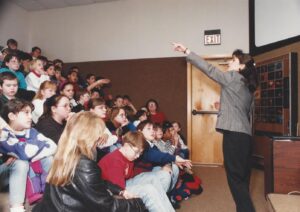I still remember getting on that bus going on the “infamous” fifth grade Robert Crown field trip. Some of my friends were excited because they were so curious about their changing bodies and what was going to happen as we became teens, but not me. I was dreading it. When I came home that day my mom asked me if I had any questions. I said, “No” and that was the end of our conversation. The rest of my sex education mostly came from friends, Seventeen Magazine, MTV, and movies as it did for many of my peers back then. When I think back, I know my mom was a product of her generation and her environment. She certainly never discussed these things with her own mom, and it was not a topic she felt comfortable discussing with her kids. When parents feel uncomfortable, kids pick up on that and feel uncomfortable too.
 Many years later as a fifth grade teacher, I became the one bringing my fifth grade students to the Robert Crown Center on the same field trip I dreaded when I was their age. I saw firsthand the same apprehension and anticipation just like my own experience. I was fortunate to be able to watch this rite of passage unfold before me. Year after year, I watched as uncomfortable fifth graders transformed into curious young people who were eager to ask insightful questions.
Many years later as a fifth grade teacher, I became the one bringing my fifth grade students to the Robert Crown Center on the same field trip I dreaded when I was their age. I saw firsthand the same apprehension and anticipation just like my own experience. I was fortunate to be able to watch this rite of passage unfold before me. Year after year, I watched as uncomfortable fifth graders transformed into curious young people who were eager to ask insightful questions.
One valuable takeaway as a teacher was the comfortable approach the Health Educators displayed when talking about these difficult topics. The presentations helped me prepare for the changes my students were going through. Without fail, every year at least one female student would begin their menstrual cycle during school. I was thankful that these students had the facts about puberty and felt comfortable telling me. I could see a level of confidence that only comes when you have the knowledge to know what to expect.
When it came time for my own children to have the puberty program at their school I was shocked. Are they really old enough to learn this already? Despite sitting through these programs for years I was surprised how difficult it was to talk about these topics with my own children. As parents we want our kids to come to us when they have questions – not Google or other online resources. Sex education topics need to be part of an ongoing conversation that we must bring up again and again when the occasion arises. It might be through a song lyric we hear while driving, a scene in a movie we are watching together, or a viral TikTok. Healthy sex education includes keeping up with what our children see and listen to as well as maintaining an open-door policy. The most opportune times to attempt a meaningful conversation can be with your child one-on-one; perhaps when you’re walking the dog, driving in the car, or when you walk in their room late at night (a time that teens seem to be the most talkative). It’s not the one thing we say or do, but a million little things that will result in an open dialogue with our children.
Now as an employee of Candor Health Education, I see firsthand what an impact our programs have on young people. So much has changed over the years and throughout our organization, but the drive to empower young people to make informed decisions remains the same. Whether it’s the changes that are happening during puberty, risks of sexual activity, or the challenges that arise from drug use, young people need the facts and the adults in their lives need the resources to support them.
For facts and resources on how to keep the conversation open about puberty, sex or drugs please visit the Candor Health Parent Resource Page.

Written by: Laura Schwartz-Business Development Manager, Candor Health Education
